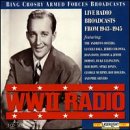| All Artists: Various Artists, Bing Crosby Title: Bing Crosby Armed Forces Broadcasts World War II Radio Members Wishing: 1 Total Copies: 0 Label: Delta Original Release Date: 7/25/1994 Re-Release Date: 6/21/1994 Album Type: Box set Genres: Jazz, Special Interest, Pop, Broadway & Vocalists Styles: Swing Jazz, Nostalgia, Oldies, Vocal Pop, Classic Vocalists, Traditional Vocal Pop Number of Discs: 5 SwapaCD Credits: 5 UPC: 018111593427 |
Search - Various Artists, Bing Crosby :: Bing Crosby Armed Forces Broadcasts World War II Radio
 | Various Artists, Bing Crosby Bing Crosby Armed Forces Broadcasts World War II Radio Genres: Jazz, Special Interest, Pop, Broadway & Vocalists
|
Larger Image |
CD Details |
CD ReviewsWWII Radio: Music and comedy that holds up 50 years later. Tom Johnson (monogram@radiks.net) | Lincoln, Nebraska | 09/02/1999 (5 out of 5 stars) "Laserlight gave America a great gift in the 1990's. Using original transcription discs from the Bing Crosby Collection at Gonzaga University in Washington State, a series of representative Kraft Music Hall radio shows was resuscitated and brought to the mass market on CD.In the 10 shows, Bing and friends like Trudy Erwin and Marilyn Maxwell sing World War II-era hits like "Swingin' On A Star," and "I'll be seeing you," accompanied by John Scott Trotter and his orchestra. Guest stars include Bob Hope, Lucille Ball, Phil Silvers, Roy Rogers, The Andrews Sisters, and others, with whom Bing banters in very witty and literate dialogue written by Carroll Carroll. (And don't forget those Kraft Cheese commercials!) The music is central, but to me, what really sells this set is the comedy spots with the various guest stars. Funny, rapid fire, and not as dated as one might expect. Special note should be made of the great digital remastering done from the original recordings. The audio was run through something called CEDAR processing, which helps to minimize or remove the clicks, pops, and other surface noise inherent in old phonograph records. The sound still has a bit of an "edge," but considering the low fidelity of the source material, this CD product is a remarkable achievement indeed.Not having lived through the WWII period (I was born in the 1950's), the series was also an education for me in America's experience with food and gas rationing, war bond drives, collecting kitchen fat (for the production of high explosives) and finding a myriad of other ways to pitch in for the war effort. All of these are promoted on the KMH shows.This CD set is a nice memory of (or an introduction to) an era when popular entertainment was still a good-hearted enterprise. I've listened to the recordings many times, and I always get a kick out of them. They leave not doubt about why why Bing Crosby was the biggest entertainer of his generation, or why the Kraft Music Hall had such a long run." Leroux From Texas Freddie Richard | Cleveland, Tx USA | 07/19/2001 (5 out of 5 stars) "Absolutely loved it, can not help but grin at the Ration point commercial for Kraft. I listen to it at work and have to shut my door half of the time because I'll have a silly grin on my face from some of the comedy. If you like Bing Crosby you will like this, if you love Bing Crosby I don't see how you can be without it. I have two single, and this box set and I'm looking for more! And remember that you can case in your left over fat for TWO Ration points at the butcher, that isn't to be ignored." But a man's reach should exceed his grasp. Samuel Chell | Kenosha,, WI United States | 11/20/2002 (4 out of 5 stars) "The most popular, influential American entertainer of the first half of the 20th century, Crosby might be described as "Dickensian" in terms of the breadth of his audience, the diversity of his prolific repertory, the numerous roles and functions he played for so many years in all media. Ironically, he's become in cultural memory little more than a seasonal event, a "Christmas Carol" as it were. These radio broadcasts give ample testimony to his contemporary appeal and possibly hint at the reasons for its temporariness. Irish songs, Christmas songs, cowboy songs, patriotic songs, Hawaiian songs, folk songs, jazz, blues--and only rarely a song from the "great American songbook" of Gershwin, Porter, Rodgers and Hart--the repertory defined largely by his successor, the less-gifted but harder-working, more venturesome Sinatra. Crosby was no doubt a genius--born with inerrant pitch and time, bodily awareness and physical grace, and an enviable vocal instrument. And there's no doubt that, despite his humble disclaimers, he was fully aware of his singular gifts--talents that made him more qualified than anyone else to play America's everything to everybody. Bing made it all look so easy, and listening to these transcriptions will represent for many a return to a reassuring, comforting father-figure. First-timers, on the other hand, might wonder what all the fuss was about, especially since there appears to be none."
|

 Track Listings (12) - Disc #1
Track Listings (12) - Disc #1